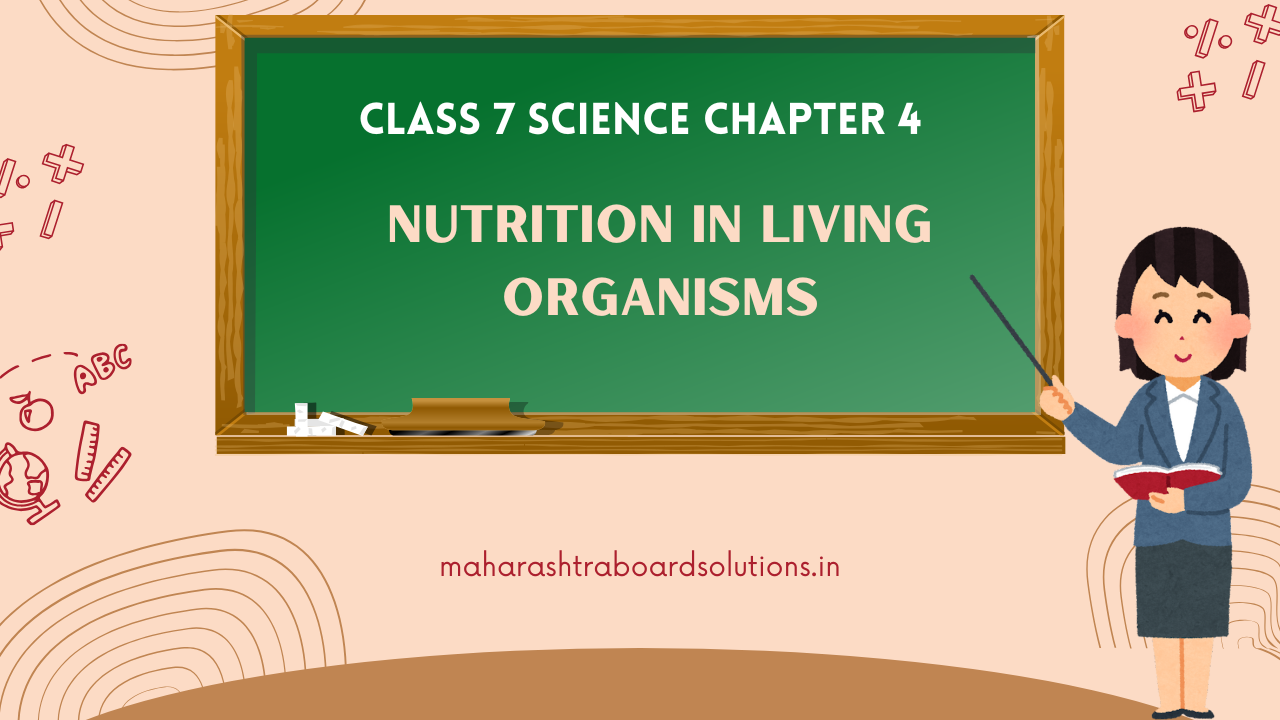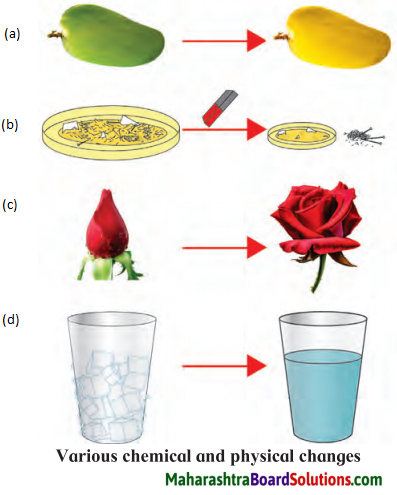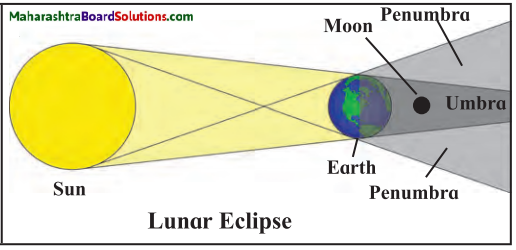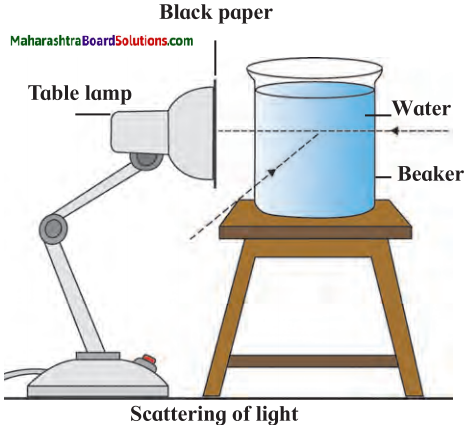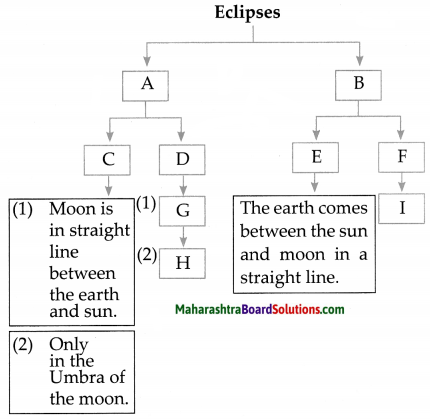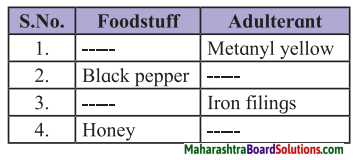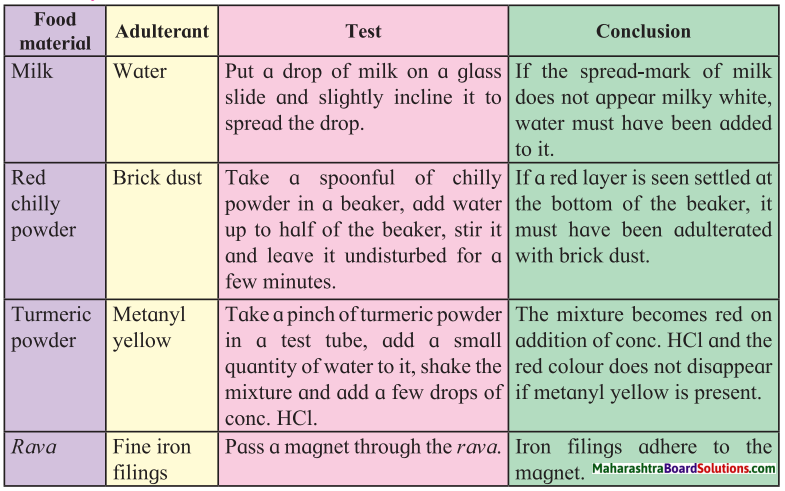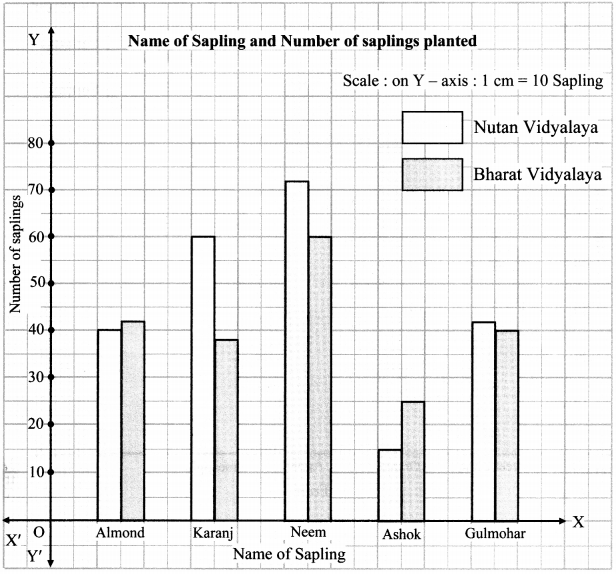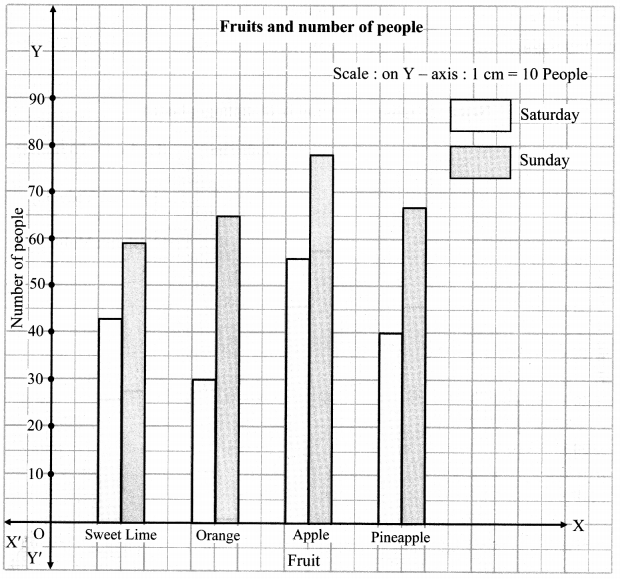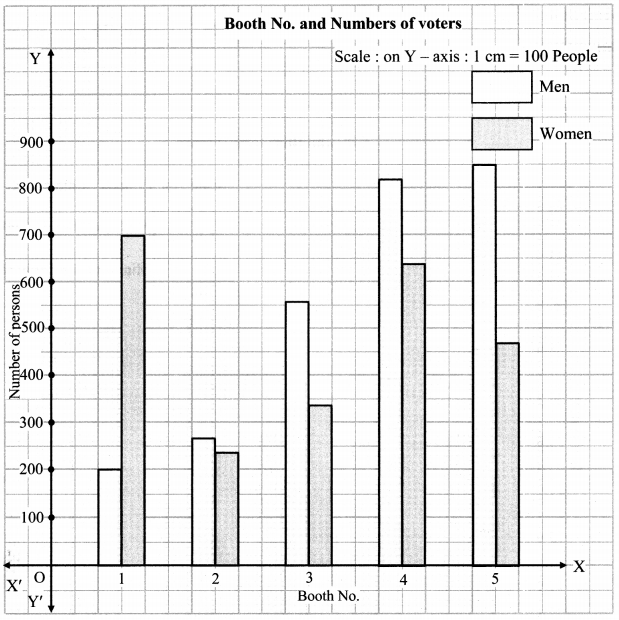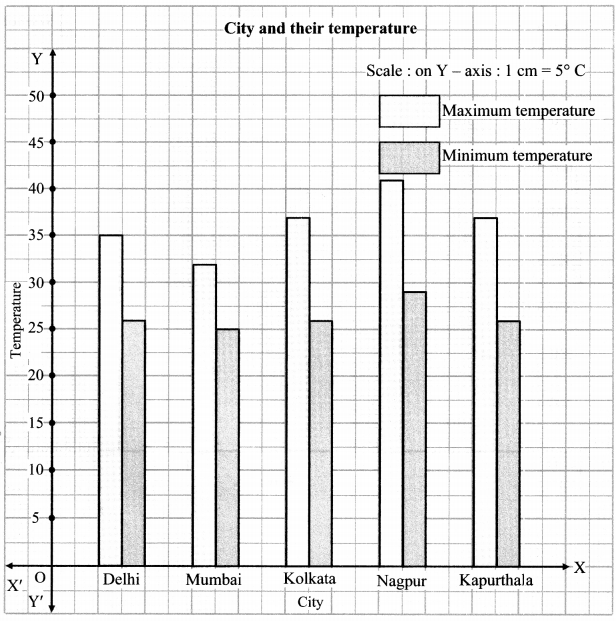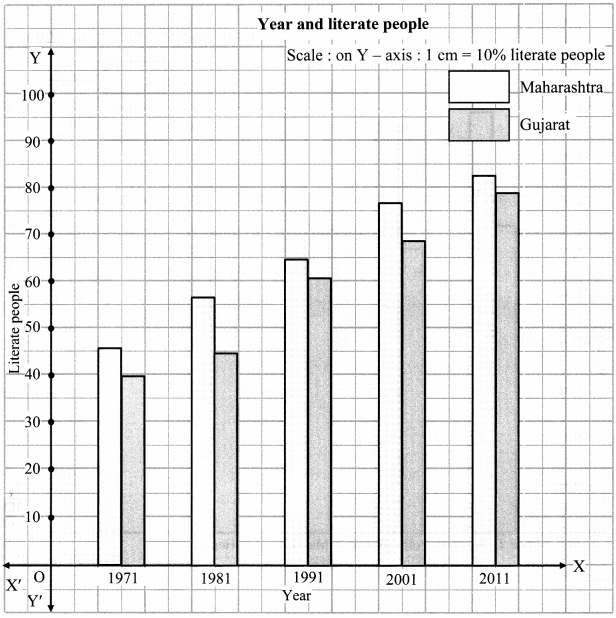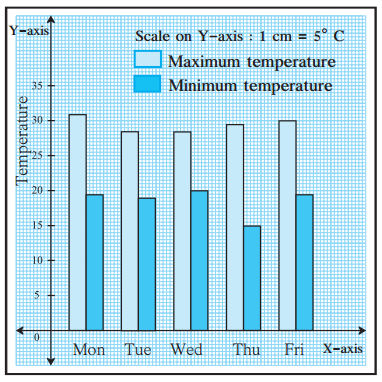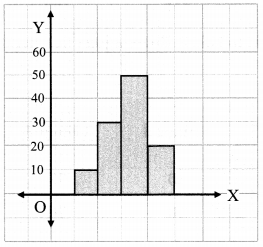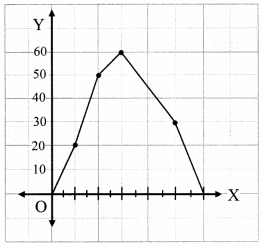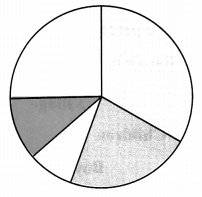Balbharti Maharashtra State Board Class 7 Science Solutions Chapter 4 Nutrition in Living Organisms Notes, Textbook Exercise Important Questions and Answers.
Std 7 Science Chapter 4 Nutrition in Living Organisms Question Answer Maharashtra Board
Class 7 Science Chapter 4 Nutrition in Living Organisms Question Answer Maharashtra Board
1. Classify according to food-type.
Tiger, cow, vulture, bacteria, deer, goat, human, fungus, lion, sparrow, buffalo, frog, cockroach, tick.
Answer:
- Carnivores: tiger, Lion
- Herbivores: cow, deer, goat, buffalo
- Scavengers: vulture
- Decomposers: fungus, bacteria
- Granivores: sparrow
- Insectivores: frog Parasitic: tick
- Omnivores: human, cockroach
![]()
2. Nutrition In Living Organisms Class 7 Exercise Match the pairs.
Class 7 Science Chapter 4 Nutrition In Living Organisms Question Answer Question 1.
| Column ‘A’ | Column ‘B’ |
| 1. Parasitic plant | a. Mushroom |
| 2. Parasitic plant | b. Lichen |
| 3. Saprophytic plant | c. Drosera |
| 4. Symbiotic plant | d. Cuscuta |
Answer:
| Column ‘A’ | Column ‘B’ |
| 1. Parasitic plant | d. Cuscuta |
| 2. Parasitic plant | c. Drosera |
| 3. Saprophytic plant | a. Mushroom |
| 4. Symbiotic plant | b. Lichen |
3. Answer the following questions in your words.
Question a.
Why do living organisms need nutrition?
Answer:
Living organisms need nutrition due to the following: (a) To supply the energy required for doing work, (b) For growth and development of the body, (c) To replace the damaged cells and repair tissues, (d) To fight diseases.
![]()
Question b.
Explain the process of production of food in plants.
Answer:
1. Green plants can produce their own food. With the help of sunlight and chlorophyll, plants make their own food in their leaves, using water and nutrients from the soil and carbon dioxide from the air.
2. This process is called as photosynthesis. In this process plants give out oxygen and take in carbon dioxide.

Question c.
What is meant by parasitic plants? Name their different types with examples of each.
Answer:
The plants that grow on the body of other plants to obtain food are called as parasitic plants.
There are two types of parasitic plants:
- Holoparasites: e.g. Rafflesiaceae
- Hemiparasites: e.g. Loranthaceae
![]()
Question d.
Explain the various steps of nutrition in animals.
Answer:
Steps of nutrition in animals are as follows:
- Ingestion: Food is taken into the body.
- Digestion: Conversion of food into simple soluble forms.
- Absorption: Transfer of soluble food to the blood.
- Assimilation: Utilization of absorbed food by cells and tissues for energy production, growth and repair.
- Egestion: Removal of waste products and undigested food from body.
Question e.
Name some unicellular organisms in which all life processes take place within their unicellular body.
Answer:
Unicellular organisms like amoeba, euglena, paramoecium in which all life processes take place within their unicellular body.
4. Give reasons.
Question a.
Insectivorous plants are attractively coloured.
Answer:
- Insectivorous plants generally grow in soil or water deficient in nitrogen compounds.
- The plant body of the Drosera burmanii has a flower like appearance. It grows close to the ground. Even its leaves are attractively pink or red in colour with hairs at the margin.
- Droplets of a sticky substances found on tips of the hairs attract insects.
- These plants consume insects to fulfill their need for nitrogen. To attract the insects these plants are attractively coloured.
![]()
Question b.
Butterflies have a long tube-like proboscis.
Answer:
Holozoic mode of nutrition means the feeding of solid and liquid food by animals. Butterflies live on nectar from flowers. Therefore to suck the nectar from flowers, they have a long tube-like structure called proboscis.
5. Prepare and complete the flowchart according to type of nutrition.
Question a.
Prepare and complete the flowchart according to type of nutrition.
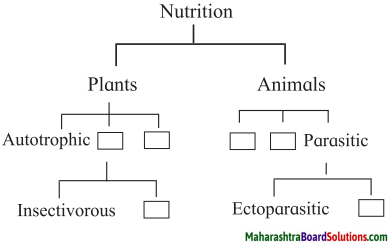
Answer:

6. Think and answer.
Question a.
We prepare a variety of foodstuffs and dishes at home. Are we then autotrophic organisms?
Answer:
- We prepare a variety of foodstuffs and dishes at home but we are not autotrophic organisms.
- In autotrophic organisms they have chlorophyll in their body and food is prepared here with help of sunlight, water and CO2 for the organisms.
- But the food which we prepare at home is not generated in our body.
![]()
Question b.
Which organisms are greater in number – autotrophs or heterotrophs? Why?
Answer:
- Autotrophs have chlorophyll in the cell and here the organic food is prepared using sunlight, water and CO2.
- They do not depend on any other organism for survival.
- But the heterotrophs depend on autotrophs and other organisms for survival. Hence autotrophs are more in number than heterotrophs.
Question c.
The number of heterotrophs found in desert regions is smaller. However, they are found in greater numbers in the sea. Why is this so?
Answer:
- In desert region due to scarcity of water and excess heat, very few cactus are found as autotrophs compared to sea. As autotrophs are less, number of heterotrophs dependent on autotrophs are smaller.
- Whereas in sea due to greater numbers of autotrophs, greater number of heterotrophs are found.
Question d.
What damage or harm do ectoparasitic and endoparasitic animals cause?
Answer:
- Ectoparasitic animals suck the blood of the animal on which it remains and endoparasitic animals get readymade food from the body of animal in which it remain.
- This way both the parasites make the animal weak by sucking their blood or by eating prepared food from them.
![]()
Question e.
Why is plant food not produced in any other parts of the plant except the green ones?
Answer:
Plant food is not produced in any other parts of the plant except the green ones because only green part contains chlorophyll and chlorophyll is very necessary for the production of food.
Class 7 Science Chapter 4 Nutrition In Living Organisms Project:
Question 1.
Many heterotrophic organisms live on one and the same plant. Observe one such plant in your neighborhood and find out about the heterotrophs that depend upon it for their food. Observe and make flotes about other organisms that use these heterotrophs as their food.
Question 2.
Prepare a Power point presentation on the topic ‘Nutrition in Living Organisms’.
Class 7 Science Chapter 4 Nutrition in Living Organisms Important Questions and Answers
Nutrition In Living Organisms Class 7 Exercise Fill in the blanks.
Nutrition In Living Organisms Class 7 Exercise Question 1.
Leaves have microscopic openings called ……………. .
Answer:
Stomata
Class 7 Science Chapter 4 Nutrition In Living Organisms Question 2.
In the process of photosynthesis plants take in ……………. and ……………. gas is given out.
Answer:
Carbondioxide, oxygen
Question 3.
The ……………. transports minerals and water from roots to all aerial parts of the plant.
Answer:
xylem
![]()
Question 4.
The ……………. transports the food from the leaves to other parts of the plant.
Answer:
phloem
Question 5.
Plants produce ……………. by the process of photosynthesis.
Answer:
Carbohydrates
Question 6.
……………. are made from carbon, hydrogen, oxygen.
Answer:
Carbohydrates
Question 7.
……………. are made from carbon, hydrogen and oxygen and nitrogen.
Answer:
proteins
Question 8.
……………. plants contain rhizobium micro-organisms.
Answer:
leguminous
![]()
Question 9.
Micro-organisms like ……………. are present in soil.
Answer:
azotobacter
Question 10.
Lichen is of a symbiosis between ……………. and ……………. .
Answer:
algae, fungi
Question 11.
The scientist ……………. identified Drosera plant in Sri Lanka in 1737.
Answer:
Johannes Burman
Question 12.
Fungi like mushroom and yeast are ……………. .
Answer:
saprophytes
Question 13.
Removal of waste products and undigested food from the body is called …………….
Answer:
Egestion
![]()
Question 14.
Amoeba moves with the help of ……………. .
Answer:
pseudopodia
Question 15.
Butterflies suck food with a tube like ……………. .
Answer:
proboscis
Question 16.
The ……………. or ……………. is an ant eating animal found in India.
Answer:
bobcat, udmanjar
Question 17.
Seed eating animals are called ……………. .
Answer:
granivores
Question 18.
Fruit eating animals are called ……………. .
Answer:
frugivores
Question 19.
Animals that obtain their food from both plants and animals are called ……………. .
Answer:
Omnivores
![]()
Question 20.
Roundworms are known as ……………. .
Answer:
endoparasites
Class 7 Science Chapter 4 Nutrition In Living Organisms Match the column:
Question 1.
| Column ‘A’ | Column ‘B’ |
| 1. Endoparasite | a. Vulture |
| 2. Ectoparasite | b. Human |
| 3. Seed eating animals | c. Tapeworm |
| 4. Fruit eating animals | d. Bed bug |
| 5. Scavenger | e. granivores |
| 6. Omnivore | f. frugivores |
Answer:
| Column ‘A’ | Column ‘B’ |
| 1. Endoparasite | c. Tapeworm |
| 2. Ectoparasite | d. Bed bug |
| 3. Seed eating animals | e. granivores |
| 4. Fruit eating animals | f. frugivores |
| 5. Scavenger | a. Vulture |
| 6. Omnivore | b. Human |
![]()
Say whether true or false, correct and rewrite the false statements.
Question 1.
Bed bug is an example of endoparasitic nutrition.
Answer:
False, Bed bug is an example of ectoparasitic nutrition
Question 2.
Spider shows saprozoic nutrition.
Answer:
True
Question 3.
The anteater is found in India.
Answer:
False. The anteater is found in Central and South America
Question 4.
Yellowing of leaves occur due to deficiency of iron.
Answer:
True
Question 5.
Mushroom is used in making bread.
Answer:
False. Yeast is used in making bread
![]()
Question 6.
Cuscuta is completely a parasitic plant.
Answer:
True
Question 7.
The nitrogen dioxide dissolves in rainwater and is converted into nitric acid.
Answer:
True
Question 8.
Micro-organism Rhizobium is found in soil.
Answer:
False. Micro-organism Azotobacter is found in soil.
Question 9.
Fixation of nitrogen occurs by biological and atmospheric methods.
Answer:
True
Question 10.
The chloroplasts present in the leaves contain chlorophyll.
Answer:
True
![]()
Question 11.
Decomposers obtain their food from living organisms.
Answer:
False, They obtain their food by decomposing the dead bodies of organisms or other materials
Question 12.
Carbondixode is given out during the process of photosynthesis.
Answer:
False, Oxygen is given out during the process of photosynthesis
Question 13.
Phloem transports the food from leaves to other parts of the plant.
Answer:
True
Question 14.
Carbohydrates are made up of carbon, hydrogen oxygen and nitrogen.
Answer:
False, Protein are made up of carbon, hydrogen, Oxygen and nitrogen.
![]()
Give scientific reasons.
Question 1.
Micro-organisms like Rhizobium are useful.
Answer:
- Rhizobium micro-organisms are useful because plants cannot take gaseous nitrogen from air.
- These micro-organisms absorb atmospheric nitrogen and convert it into its nitrate, a compound which is useful for plant.
Question 2.
Lichen is an example of a symbiotic nutrition.
Answer:
Lichen is a symbiosis between algae and fungi in which fungi provides water, minerals, as well as shelter to algae and in return the algae Master Key General Science (Std. 7), provide food to the fungi. So Lichen, is an example of symbiotic nutrition.
Question 3.
Drosera burmanii is an insectivorous plant.
Answer:
Drosera burmanii grows in a soil which has nitrogen deficiency. It feeds upon insects to obtain nitrogen, so it is an insectivorous plant.
![]()
Question 4.
Human is an omnivore.
Answer:
Humans obtain their food from both, plants and animals so human is an omnivore.
Question 5.
Tapeworm is an endoparasite.
Answer:
Tapeworm lives inside the body of other animals and obtain its food. So tapeworm is an endoparasite.
Question 6.
Decomposers are important for the ecosystem
Answer:
Decomposers feed on dead and decaying matter and therefore indirectly clean the ecosystem. If decomposers were not there then nutrients would not be able to return back and get recycled. Therefore decomposers are very important for the ecosystem.
![]()
Question 7.
Cuscuta is a total parasite while Loranthus is a partial parasite.
Answer:
Cuscuta is a nongreen yellow thread-like plant completely dependent on the host plant, loranthus is a partial parasitic because it can prepare its own food and it only takes water and minerals from the host plant.
Answer the following in your own words:
Question 1.
Classify the types of nutrients.
Answer:
There are two types of nutrients.
- Nutrients like carbohydrates, proteins and fats are required in large quantity. These are macro-nutrients.
- Minerals and vitamins are required in very small quantity. They are called micro-nutrients.
Question 2.
Explain the types of nutrition.
Answer:
There are two types of nutrition.
- Some organisms can produce their own food and thus nourish themselves. This is called autotrophic nutrition.
- Some organisms depend on other organisms, plants and animals for their food. This is called heterotrophic nutrition.
![]()
Question 3.
Write differences between xylem and phloem.
Answer:
| xylem | Phloem |
| 1. The xylem transports minerals and water from the root to all aerial parts of the plant. | 1. The phloem transports the food (glucose) from the leaves to other parts of the plant where it is either consumed or stored. |
Question 4.
What is chemosynthesis? Which plants produce their food by chemosynthesis?
Answer:
- Chemosynthesis is the biological conversion of one or more carbon-containing molecules and nutrients into organic matter.
- It uses the oxidation of inorganic compounds or methane as a source of energy rather than sunlight.
- Sulphur bacteria and nitrosomonas produce their food by chemosynthesis.
Question 5.
Name the micro-organisms which help in biological fixation of nitrogen. How?
Answer:
Two different types of micro-organisms can bring about biological nitrogen fixation.
- Root-nodules of leguminous plants contain the micro-organism rhizobium. These micro-organisms absorb atmospheric nitrogen and convert if into its nitrate, a compound.
- Micro-organisms like azotobacter are’present in soil. They also convert atmospheric nitrogen into nitrates.
![]()
Question 6.
What is symbiotic nutrition? Give one example of it.
Answer:
- Two or more than two different types of plant live together to fulfill their needs of nutrition, protection, support etc. with each other’s help. This type of nutrition is called symbiotic nutrition.
- e.g. Lichen is an example of symbiosis between algae and fungi.
Question 7.
Write about Drosera burmanii.
Answer:
- It is art insectivorous plant.
- The scientist Johannes Burman identified this plant in Sri Lanka in 1737. Hence, the plant is named after him.
- It grows close to the ground.
- Its leaves are attractively pink or red in colour with hairs at the margin.
- Droplets of a sticky substance found at the tips of the hairs attract insects.
- It grows in a place where deficiency of nitrogen in the soil. To get nitrogen for its growth, it eats insects.
Question 8.
What are called saprophytic plants? Give Examples.
Answer:
Plants which obtain the food from dead and decaying bodies of other organisms are called saprophytic plants e.g. Yeast and mushrooms.
![]()
Question 9.
Classify the animals according to the type of food they eat.
microbes, vulture, monkey, tiger, lion, goat, cow, buffalo, crow, hyena, human, chimpanzee
Answer:
- Herbivores: goat, cow, buffalo.
- Carnivores: tiger, lion
- Omnivores: monkey, human, chimpanzee
- Scavengers: vulture, crow, hyena
- Decomposers: microbes
Explain the terms:
- Herbivores: Animals that depend on plants only for their food are called Herbivores.
- Carnivores: Animals that depend on other animals for their food are called Carnivores.
- Granivores: Animals that eat grains (seed) are called Granivores.
- Frugivores: Animals that eat fruits are called frugivores.
- Omnivores: Animals that obtain their food from both plants and animals are called omnivores.
- Scavengers: Animals that obtain their food from dead bodies of animals are called Scavengers.
- Decomposers: Microbes which obtain their food by decomposing the dead bodies of organisms or other materials are called decomposers.
- Ectoparasitic nutrition: Some animals live on the body surface of other animals and obtain their food by sucking their blood. This is called ectoparasitic nutrition.
- Endoparasitic nutrition: Some animals live inside the body of other animals and obtain their food. This is called endoparasitic nutrition.
- Symbiotic nutrition: In some cases, two or more than two different types of plants live together to fulfill their needs of nutrition, protection, support etc. with each other’s help. This type of nutrition is called symbiotic nutrition.
Write the role of different nutrients like nitrogen, phosphorus, potassium,magnesium, Iron, manganese and zinc and effects of their deficiency on plants.
Question 1.
Write the role of different nutrients like nitrogen, phosphorus, potassium, magnesium, Iron, manganese and zinc and effects of their deficiency on plants.
Answer:
Role of nutrients and effects of their deficiency on plants:
| Nutrients | Function | Effects of deficiency |
| Nitrogen | Important components of proteins, chlorophyll and cytoplasm. | Retarded/stunted growth, yellowing of leaves. |
| Phosphorus | Conversion of light energy into chemical energy. | Early leaf-fail, late flowering, slow growth of roots. |
| Potassium | Necessary for metabolic activities. | Weak stem, wilting of leaves, failure to produce carbohydrates. |
| Magnesium | Production of chlorophyll | Slow/retarded growth, yellowing of leaves. |
| Iron | Production of chlorophyll | Yellowing of leaves |
| Manganese | Production of main plant hormones | Retarded growth, spotted leaves |
| Zinc | Production of hormones and their intermediates | Retarded growth, yellowing of leaves |
![]()
Can you tell?
Answer the following question:
Question 1.
How does ingestion occur in unicellular animals like amoeba?
Answer:
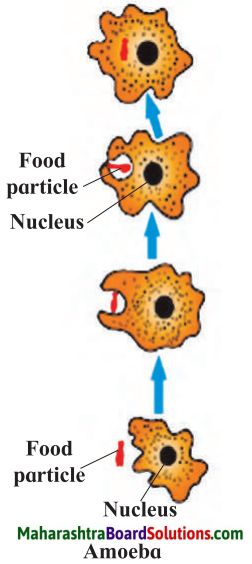
- Amoeba does not have organs like hands and mouth.
- It is a unicellular animal. It can take in food through any part of the surface of its unicellular body.
- It surrounds the food particle from all sides to take it into the cell.
- After that it digests the food with the help of different enzymes.
- Undigested food is left behind as the amoeba moves further with the help of pseudopodia.
- In unicellular animals like amoeba, euglena, paramoecium,. etc. all the steps of nutrition occur within their unicellular body.
![]()
Question 2.
How do plants produce their own food?
Answer:
Green plants produce their own food with the help of sunlight, chlorophyll, water, nutrients from soil and carbon dioxide from the air. This process is called as photosynthesis

Use your brain power!
Answer the following questions:
Question 1.
Write the uses of yeast and mushrooms.
Answer:
Yeast is used in fermentation processes and making bread.
Mushrooms are a rich source of vitamins and iron.
Question 2.i
Which part of the loranthus plant carries out photosynthesis?
Answer:
Leaves of the loranthus plant carries out photosynthesis.
![]()
Question 2.ii
From where do they obtain minerals and water?
Answer:
They obtain water and minerals from the xylem and phloem of the other host plant.
Question 2.iii
Why is loranthus known as a partially parasitic plant?
Answer:
Loranthus is known as partially parasitic plant because it does photosynthesis with the help of leaves but only for water and minerals it depends on other plants.
Question 3.
Why does the pitcher plant feed on insects even though it produces food by photosynthesis?
Answer:
Pitcher plants grow in a place where soil has deficiency of nitrogen compounds so to fulfill the need of nitrogen they feed on insects.
Observe the diagram and answer the following questions.

Question a.
Name the process shown in the picture.
Answer:
The process shown is photosynthesis.
![]()
Question b.
Which type of plants use the above process for their nutrition?
Answer:
Autotrophic plants (green plants) use the above process for their nutrition.
Question c.
What is the pigment in the leaf that helps in the above process?
Answer:
Chlorophyll
Question d.
Give the chemical equation of the above process?
Answer:

Question e.
What is the importance of this process to living things?
Answer:
Photosynthesis helps the plants to prepare their own food and also store it in their plant bodies. Animals depend upon this stored food for their nutrition.
During photosynthesis, oxygen is given out which is important for all living organisms for respiration.
Observe the diagram and answer the following questions.

Question a.
What is shown in the picture?
Answer:
Roots of leguminous plants having root nodules.
![]()
Question b.
What is the importance of these types of plants?
Answer:
These types of plants help to provide nitrogen to the soil.
Question c.
What is the process called?
Answer:
Biological Nitrogen fixation
Question d.
Explain the process.
Answer:
Root nodules of leguminous plants contain Rhizobium micro-organisms. These micro¬organisms convert atmospheric nitrogen into nitrates. Thus the soil becomes rich in nitrogen.
7th Std Science Questions And Answers:
- The Living World: Adaptations and Classification Class 7 Questions And Answers
- Plants: Structure and Function Class 7 Questions And Answers
- Properties of Natural Resources Class 7 Questions And Answers
- Nutrition in Living Organisms Class 7 Questions And Answers
- Food Safety Class 7 Questions And Answers
- Measurement of Physical Quantities Class 7 Questions And Answers
- Motion, Force and Work Class 7 Questions And Answers
- Static Electricity Class 7 Questions And Answers
- Heat Class 7 Questions And Answers
- Disaster Management Class 7 Questions And Answers
